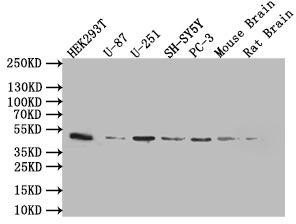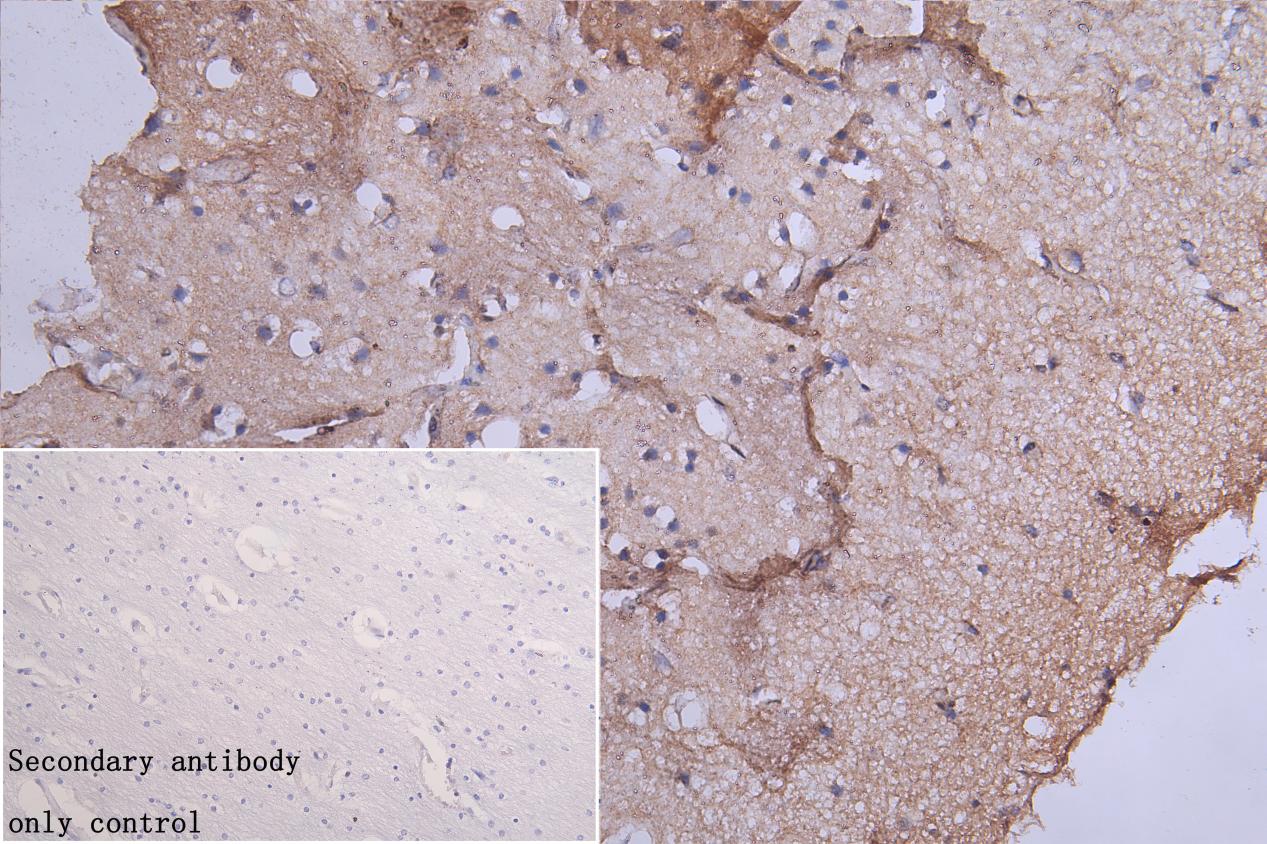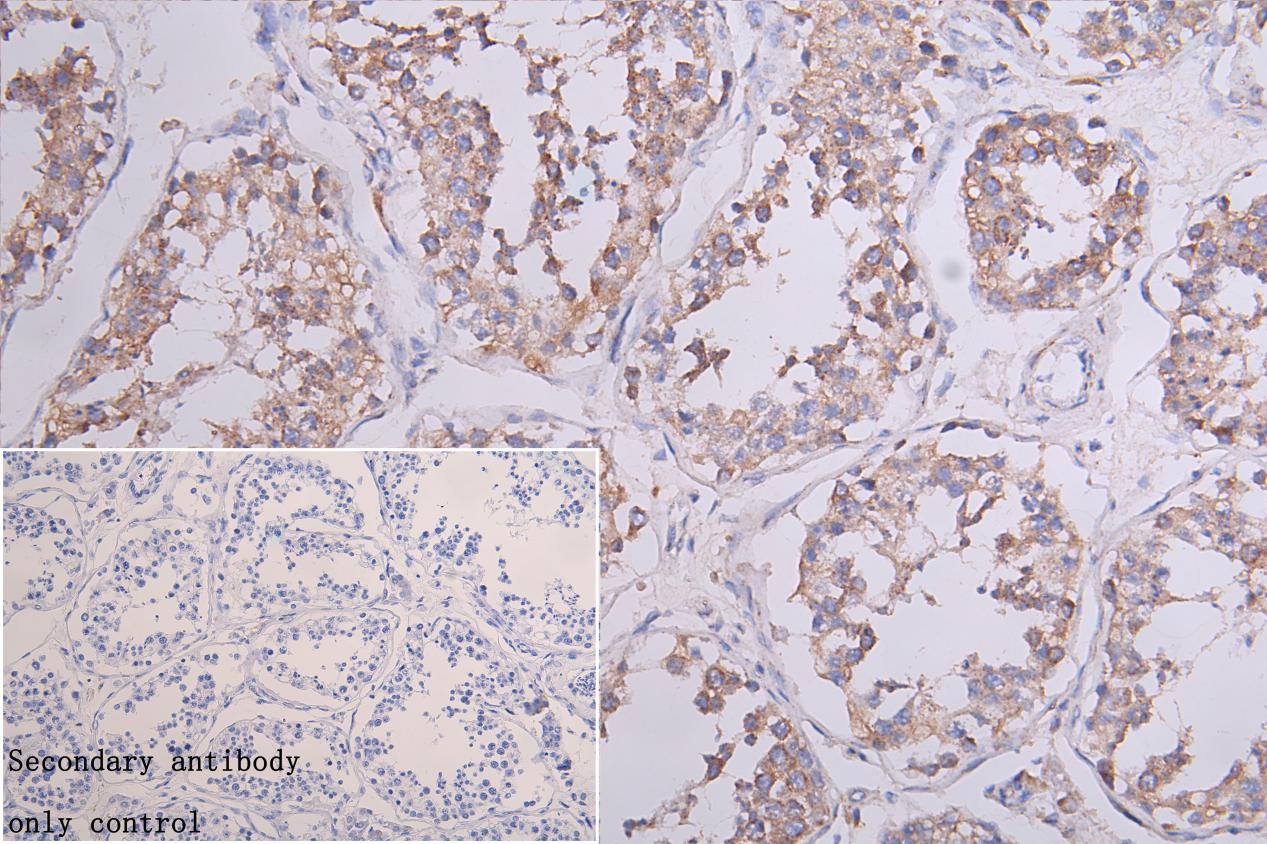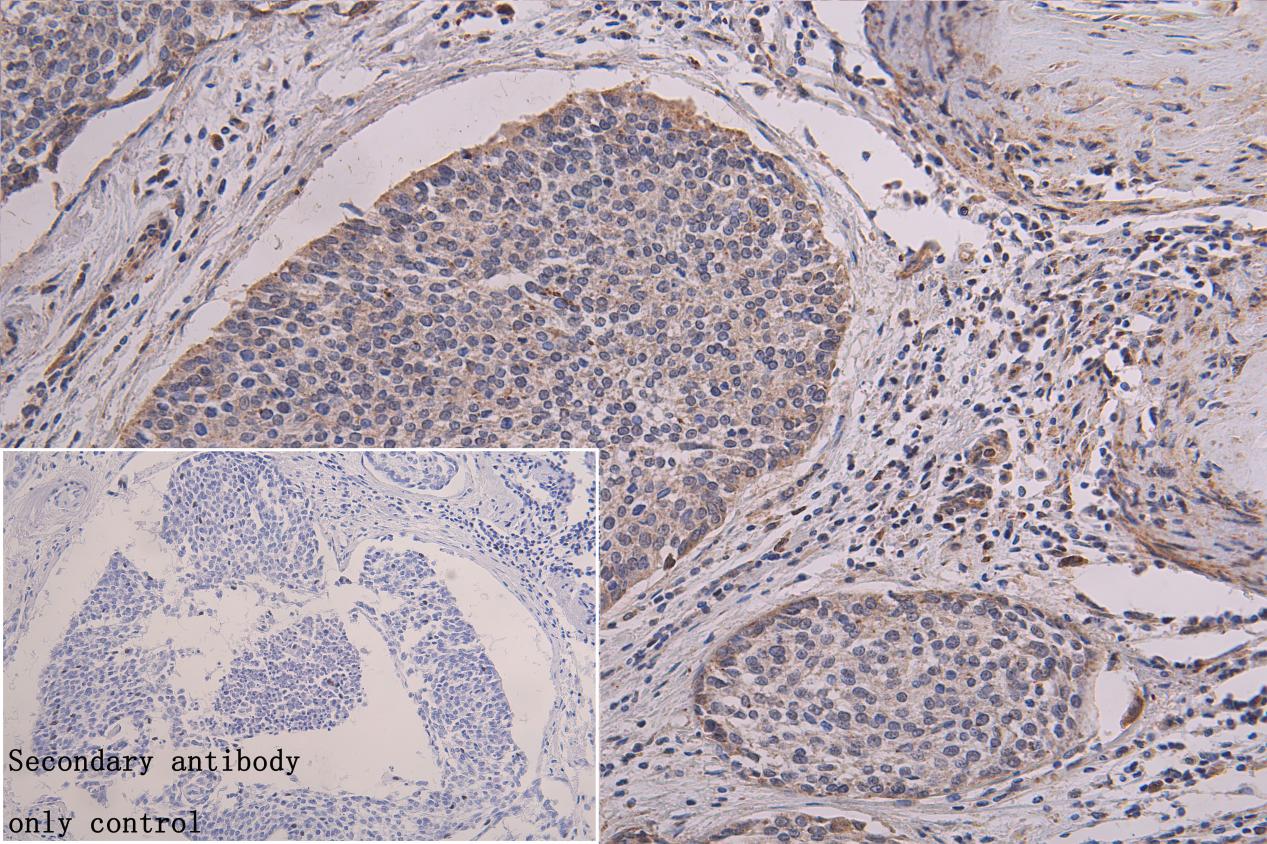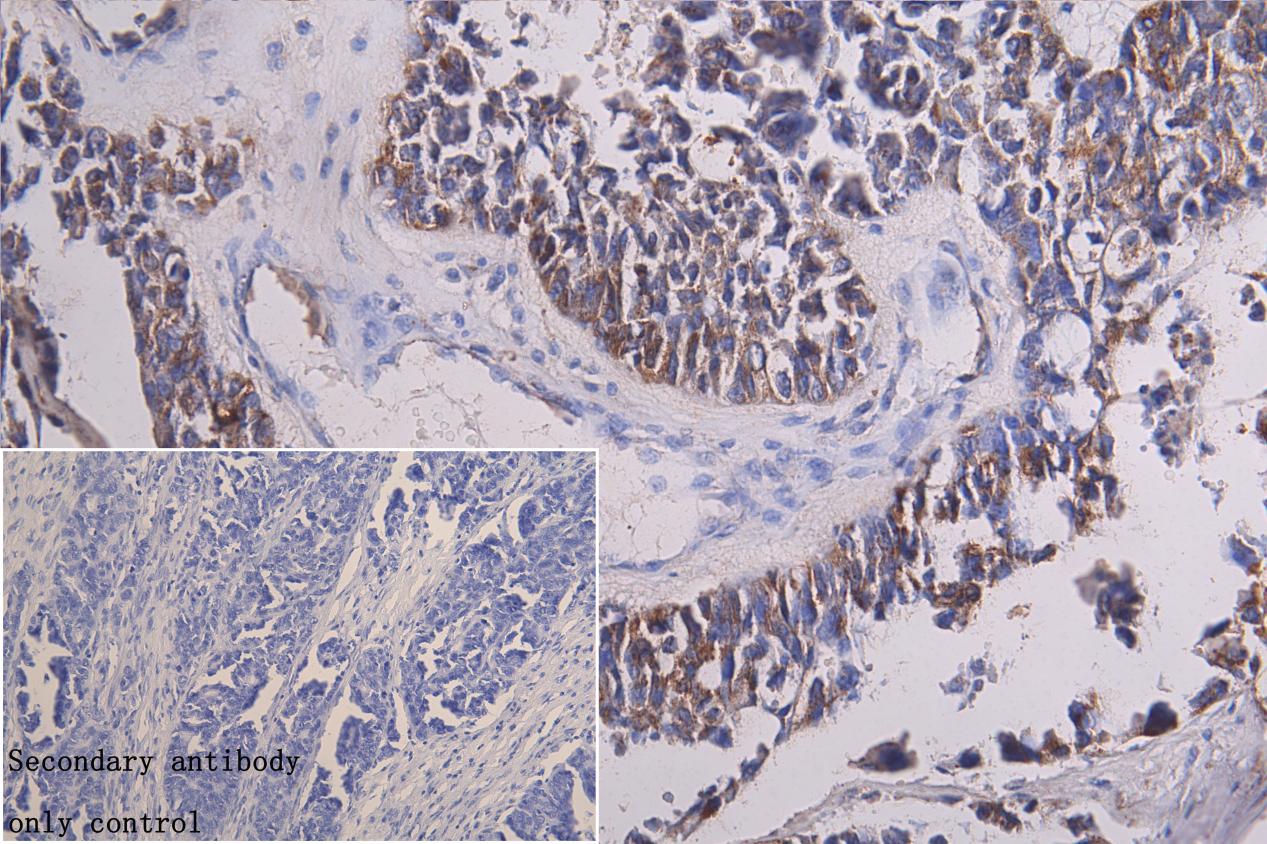SPOCK1 Antibody
-
中文名稱:SPOCK1兔多克隆抗體
-
貨號:CSB-PA730785LA01HU
-
規(guī)格:¥440
-
促銷:
-
圖片:
-
Western Blot
Positive WB detected in: 293T whole cell lysate (20μg), U87 whole cell lysate (20μg), U251 whole cell lysate (20μg), SY5Y whole cell lysate (20μg), PC-3 whole cell lysate (20μg), Mouse brain tissue lysate (20μg), Rat brain tissue lysate (20μg)
All lanes: SPOCK1 antibody at 1:1000
Secondary
Goat polyclonal to rabbit IgG at 1/50000 dilution
Predicted band size: 50 kDa
Observed band size: 50 kDa -
IHC image of CSB-PA730785LA01HU diluted at 1:100 and staining in paraffin-embedded human brain tissue performed on a Leica BondTM system. After dewaxing and hydration, antigen retrieval was mediated by high pressure in a citrate buffer (pH 6.0). Section was blocked with 10% normal goat serum 30min at RT. Then primary antibody (1% BSA) was incubated at 4°C overnight. The primary is detected by a Goat anti-rabbit polymer IgG labeled by HRP and visualized using 0.05% DAB. Secondary antibody only control: uses 1% BSA instead of primary antibody
-
IHC image of CSB-PA730785LA01HU diluted at 1:100 and staining in paraffin-embedded human testis tissue performed on a Leica BondTM system. After dewaxing and hydration, antigen retrieval was mediated by high pressure in a citrate buffer (pH 6.0). Section was blocked with 10% normal goat serum 30min at RT. Then primary antibody (1% BSA) was incubated at 4°C overnight. The primary is detected by a Goat anti-rabbit polymer IgG labeled by HRP and visualized using 0.05% DAB. Secondary antibody only control: uses 1% BSA instead of primary antibody
-
IHC image of CSB-PA730785LA01HU diluted at 1:100 and staining in paraffin-embedded human Cervical cancer tissue performed on a Leica BondTM system. After dewaxing and hydration, antigen retrieval was mediated by high pressure in a citrate buffer (pH 6.0). Section was blocked with 10% normal goat serum 30min at RT. Then primary antibody (1% BSA) was incubated at 4°C overnight. The primary is detected by a Goat anti-rabbit polymer IgG labeled by HRP and visualized using 0.05% DAB. Secondary antibody only control: uses 1% BSA instead of primary antibody
-
IHC image of CSB-PA730785LA01HU diluted at 1:100 and staining in paraffin-embedded human endometriall cancer tissue performed on a Leica BondTM system. After dewaxing and hydration, antigen retrieval was mediated by high pressure in a citrate buffer (pH 6.0). Section was blocked with 10% normal goat serum 30min at RT. Then primary antibody (1% BSA) was incubated at 4°C overnight. The primary is detected by a Goat anti-rabbit polymer IgG labeled by HRP and visualized using 0.05% DAB. Secondary antibody only control: uses 1% BSA instead of primary antibody
-
-
其他:
產(chǎn)品詳情
-
產(chǎn)品描述:
The SPOCK1 polyclonal antibody CSB-PA730785LA01HU was produced in the rabbit immunized with the recombinant human Testican-1 protein (290-435aa). The target protein SPOCK1, also known as Testican-1 protein, mainly modulates cell adhesion, migration, and proliferation by interacting with other ECM proteins, proteases, and growth factors.
This SPOCK1 antibody was tested in the ELISA, WB, IHC, and IF applications. The non-conjugated IgG got purified by protein G affinity chromatography and reached up to 95% in purity. It reacts with the SPOCK1 proteins from human and mouse samples.
-
產(chǎn)品名稱:Rabbit anti-Homo sapiens (Human) SPOCK1 Polyclonal antibody
-
Uniprot No.:
-
基因名:SPOCK1
-
別名:SPOCK1 antibody; SPOCK antibody; TIC1 antibody; TICN1 antibody; Testican-1 antibody; Protein SPOCK antibody
-
宿主:Rabbit
-
反應(yīng)種屬:Human, Mouse,Rat
-
免疫原:Recombinant Human Testican-1 protein (290-435AA)
-
免疫原種屬:Homo sapiens (Human)
-
克隆類型:Polyclonal
-
抗體亞型:IgG
-
純化方式:Antigen affinity purification
-
濃度:It differs from different batches. Please contact us to confirm it.
-
保存緩沖液:Liquid in PBS containing 50% glycerol, and 0.02% sodium azide.
-
產(chǎn)品提供形式:Liquid
-
應(yīng)用范圍:ELISA, WB, IHC
-
推薦稀釋比:
Application Recommended Dilution WB 1:500-1:2000 IHC 1:20-1:200 -
Protocols:
-
儲存條件:Upon receipt, store at -20°C or -80°C. Avoid repeated freeze.
-
貨期:Basically, we can dispatch the products out in 1-3 working days after receiving your orders. Delivery time maybe differs from different purchasing way or location, please kindly consult your local distributors for specific delivery time.
相關(guān)產(chǎn)品
靶點(diǎn)詳情
-
功能:May play a role in cell-cell and cell-matrix interactions. May contribute to various neuronal mechanisms in the central nervous system.
-
基因功能參考文獻(xiàn):
- Testican-1 blood level is related to the severity of sepsis and Testican-1 could be used as a biomarker to determine the severity of sepsis. PMID: 29315764
- Overexpression of SPOCK1was confirmed in head and neck squamous cell carcinoma clinical specimens. Overexpression of SPOCK1 contributes to the aggressive nature of HNSCC. PMID: 29233721
- High SPOCK1 expression is associated with castration-resistant prostate cancer. PMID: 28534948
- downregulation of both strands of pre-miR-150 and overexpression of SPOCK1 are involved in esophageal squamous cell carcinoma (ESCC). pathogenesis. The involvement of passenger strand miRNAs in the regulation of cancer cell aggressiveness is a novel concept in RNA research PMID: 28659612
- is significantly upregulated in osteosarcoma tissue. PMID: 28869894
- Functional assessment in cocultures demonstrated that SPOCK1 strongly affects the composition of the extracellular collagen matrix and by doing so, enables invasive tumor cell growth in Pancreatic ductal adenocarcinoma. PMID: 28486750
- Transcriptomic analysis of EPCR-silenced tumors unveiled an effect mediated by matricellular SPOCK1/testican 1. SPOCK1 silencing suppressed in vitro 3D growth. SPOCK1 ablation decreased orthotopic tumor growth and reduced metastatic osteolytic tumors. High SPOCK1 levels were also associated with poor clinical outcome in a subset of breast cancer patients. PMID: 28103946
- a novel TGF-beta-induced myoepithelial marker and enhanced invasion in breast cancer cells and correlated with poor prognosis PMID: 27626636
- Our results suggested that microRNA-129-5p could directly specifically suppress SPOCK1, which might be one of the potential mechanisms in inhibiting cell processes including viability, proliferation, cell mitosis, migration, and invasiveness of gastric cancer cells. PMID: 28653880
- SPOCK1 expression is significantly up-regulated in colorectal cancer tissues and associated with tumor size and stage. SPOCK1 stimulates the PI3K/AKT signaling pathway to inhibit cell apoptosis and promote tumor growth. PMID: 27889608
- findings suggest that SPOCK1 is a critical mediator of tumor growth and metastasis in prostate cancer PMID: 27486308
- Knockdown of SPOCK1 inhibits the proliferation. PMID: 28281964
- This study suggests that SPOCK1 promotes proliferation, migration and invasion in glioma cells by activating PI3K/AKT and Wnt/beta-catenin pathways, which provides a potential theoretical basis for clinical treatment of glioma. PMID: 27108836
- SPOCK1 is highly expressed in ovarian cancer.SPOCK1 contributes to ovarian cancer development and metastasis. PMID: 26638890
- These results suggest that up-regulation of SPOCK1 in ESCC induces EMT, thus promotes migration and invasion in ESCC cells. PMID: 26077618
- Collectively, altered expression of PKP1 and SPOCK1 appears to be a frequent and critical event in prostate cancer PMID: 26138584
- SPOCK1 activates PI3K/Akt signaling. PMID: 25623055
- Testican-1-induced EMT signaling. PMID: 23873022
- this study showed that SPOCK1 is a novel metastasis related biomarker in lung cancer and may be new diagnostic and therapeutic target for lung cancer. PMID: 24134845
- In the present study, we showed that SPOCK1 could inhibit apoptosis and promote cancer invasion. PMID: 23022495
- Significant overexpression of osteonectin mRNA is associated with pancreatic cancer PMID: 16596217
- SPOCK gene underlies variation of age at menarche PMID: 19282985
顯示更多
收起更多
-
亞細(xì)胞定位:Secreted, extracellular space, extracellular matrix.
-
數(shù)據(jù)庫鏈接:
Most popular with customers
-
-
Phospho-YAP1 (S127) Recombinant Monoclonal Antibody
Applications: ELISA, WB, IHC
Species Reactivity: Human
-
-
-
-
-
-


